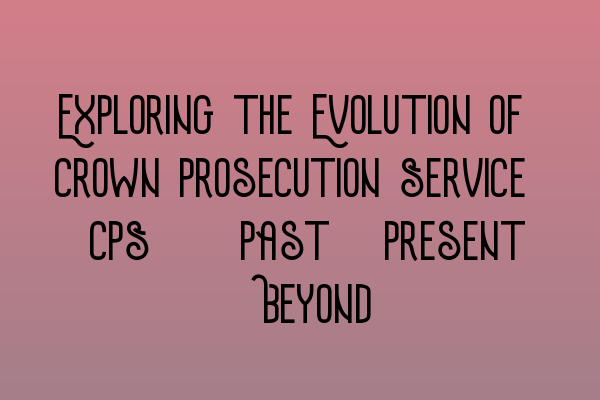Exploring the Evolution of Crown Prosecution Service (CPS): Past, Present & Beyond
Welcome to SQE Criminal Law & Practice Law UK! In this blog post, we will delve into the fascinating history and evolution of the Crown Prosecution Service (CPS), examining how it has transformed over the years and what the future holds for this crucial institution.
The Origins of the Crown Prosecution Service
The roots of the CPS date back several centuries to the English legal system. It has come a long way since its inception and has played a vital role in shaping the criminal justice landscape in the United Kingdom.
In the past, the responsibility of prosecuting crimes rested primarily with the police. However, as the complexity and volume of cases increased, the need for a dedicated organization to handle prosecutions became apparent.
The modern CPS as we know it today was established in 1986, under the Prosecution of Offences Act 1985. Its creation marked a significant shift in the criminal justice system, with the CPS becoming an independent body responsible for prosecuting criminal cases in England and Wales.
The Role of the Crown Prosecution Service
The primary role of the CPS is to ensure that justice is served by providing independent and fair prosecutions. The CPS works closely with the police, gathering evidence, making charging decisions, and presenting cases in court.
One of the key principles guiding the CPS is its commitment to acting in the public interest. This means considering factors such as the seriousness of the offense, the impact on victims and communities, and the likelihood of securing a conviction when deciding whether to prosecute.
Over the years, the CPS has evolved to adapt to changing societal and legal landscapes. It has implemented various reforms and initiatives to improve the efficiency and effectiveness of its operations, such as the introduction of digital technologies and streamlined case management systems.
The Future of the Crown Prosecution Service
The CPS continues to face new challenges and opportunities in the 21st century. As technology advances and new types of crimes emerge, the CPS must stay ahead of the curve to effectively prosecute offenders and safeguard the rights of the accused.
Additionally, there is an increasing focus on diversity and inclusivity within the criminal justice system. The CPS plays a crucial role in championing equality and ensuring that prosecutions are conducted without bias or discrimination.
To meet these evolving demands, the CPS is constantly reviewing its policies and procedures and investing in training and development for its staff. Collaboration with other agencies, such as the police and victim support organizations, is also key to providing a holistic approach to casework.
Conclusion
The Crown Prosecution Service has come a long way since its inception, adapting and evolving to meet the challenges of a changing society. As a crucial component of the criminal justice system, the CPS plays a vital role in upholding the rule of law.
If you want to learn more about the Crown Prosecution Service or prepare for your SQE exams, make sure to check out our related articles:
- SQE 1 Practice Exam Questions
- SQE 1 Practice Mocks FLK1 FLK2
- SQE 2 Preparation Courses
- SQE 1 Preparation Courses
- SRA SQE Exam Dates
At SQE Criminal Law & Practice Law UK, we are committed to helping you succeed in your legal studies and preparing you for a successful career in the field of criminal law. Stay tuned for more informative articles and updates!
